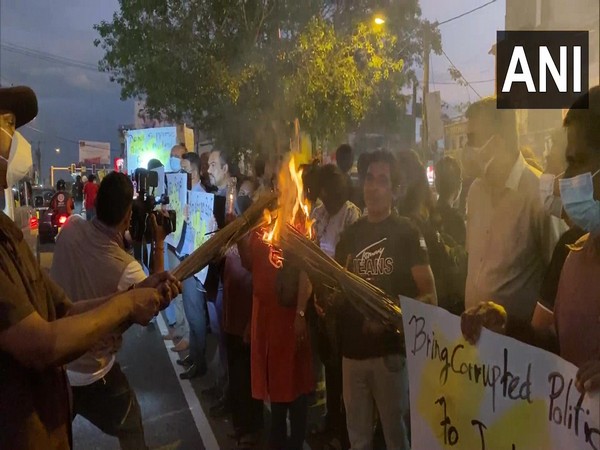Sri Lanka is witnessing an economic debacle which is exacerbating with time. It saw its most violent day recently as Sri Lankan PM Mahinda Rajapaksa resigned from his post amid the economic instability.
Repercussions and Causes
This is no more a secret that the root cause of this crisis is the gross mismanagement of the economy and a sustained twin deficit. “Sri Lanka is a classic twin deficits economy,” said a 2019 Asian Development Bank working paper, adding, “Twin deficits signal that a country’s national expenditure exceeds its national income and that its production of tradable goods and services is inadequate.”
Sri Lanka is currently in the throes of economic turmoil since its independence from Britain in 1948. But the current crisis is accelerated by deep tax cuts promised by Rajapaksa during a 2019 election campaign that was enacted months before the COVID-19 pandemic, which wiped out parts of Sri Lanka’s economy.
Debt-ridden Sri Lanka’s inflation soared to 21.5%. According to the Department of Census and Statistics statement, the high inflation level has hit the prices of most essential food items such as rice, sugar, milk, and bread. Sri Lanka’s economic crisis is caused in part by a lack of foreign currency, leading to acute shortages and very high prices. Thousands of demonstrators have hit the streets across Sri Lanka since April 9.
The pandemic sapped the lucrative tourism industry and foreign workers’ remittances, and credit rating agencies moved to downgrade Sri Lanka and effectively locked it out of international capital markets. In two years, Sri Lanka’s debt management programme, which depended on accessing those markets, derailed and foreign exchange reserves plummeted by almost 70%.
The Rajapaksa government’s decision to ban all chemical fertilisers in 2021, a move that was later reversed, also hit the country’s farm sector and triggered a drop in the critical rice crop.
Sri Lankan government said it would temporarily default on USD 35.5 billion in foreign debt as the pandemic and the war in Ukraine made it impossible to make payments to overseas creditors. Sri Lanka’s finance ministry confirmed that it would miss USD 78 million in interest rate payments on international sovereign bonds.
Meanwhile, India extended the duration of the USD 400 million currency swap facility that was concluded with the island nation in January. Sri Lanka and India have signed a $1 billion credit line for importing essentials, including food and medicine, and the Rajapaksa government has sought at least another $1 billion from New Delhi.
As of February, the country was left with only $2.31 billion in its reserves but faced debt repayments of around $4 billion in 2022, including a $1 billion international sovereign bond (ISB) maturing in July. ISBs make up the largest share of Sri Lanka’s foreign debt at $12.55 billion, with the Asian Development Bank, Japan and China among the other major lenders.
Last month, IMF said that public debt had risen to “unsustainable levels” and foreign exchange reserves were insufficient for near-term debt payments.
The deepening of anger against the ruling party also stirred the political ecosystem, which led the opposition party, Samagi Jana Balawegaya (SJB), to submit no-confidence motions against President Gotabaya Rajapaksa and the coalition government headed by his brother, Mahinda Rajapaksa. Another no-trust motion was moved by the main Tamil party, TNA, and the United National Party against the President.
Addressing the Sri Lankan Parliament, Finance Minister Ali Sabry said that the government is set to replace the existing Budget, calling it “unrealistic”. He added that they were in talks with the World Bank to extend its support by $300 million to $700 million.
Under intense pressure from within his own Sri Lanka Podujana Peramuna (SLPP) ranks to resign, Rajapaksa gathered his supporters to apply counterpressure not to stand down.
A tense situation prevailed as a group of supporters of Prime Minister Mahinda Rajapaksa attacked the protesters outside the ‘MainaGoGama’, a protest site near Temple Trees, the Prime Minister’s official residence. Shots were fired from inside the Sri Lankan Prime Minister’s official residence.
The military deployed hundreds of troops to guard the outgoing premier and his aides at the residence after protesters pulled down a rear gate. Thousands of protesters had defied an indefinite curfew declared earlier in the day to maintain their siege on the residence. The police formed a human chain to prevent the protesters from entering. However, the mob pushed their way past the police human chain and attacked GotaGoGama.
Protesters who have camped out in downtown Colombo for weeks to demand the resignation of the Rajapaksa brothers were also reportedly targeted. The Colombo National Hospital said that at least 16 people had been admitted to the hospital following the incident.
The ancestral home of the Rajapaksa family in the southern district of Hambantota was also set on fire. Police also reported angry mobs had attacked dozens of homes of ruling party politicians across the island.
As the people in Sri Lanka are facing a catastrophic economic crisis, the government must protect the human rights of everyone and ensure an enabling environment for peacefully expressing dissent, Amnesty International said in a report.
Yamini Mishra, South Asia Regional Director for Amnesty International, said, “Any austerity measures introduced in Sri Lanka must be based on a human rights assessment, should be open for public scrutiny and feedback in an inclusive and participatory process, and all alternatives must be explored before they are introduced. Austerity measures must not disproportionately impact the marginalised groups and must be strictly temporary.”
The story is far from over. The recent violent demonstrations and angst show that the situation is much grimmer than anticipated. It seems that, unfortunately, woes have just begun for Sri Lanka.




















Comments